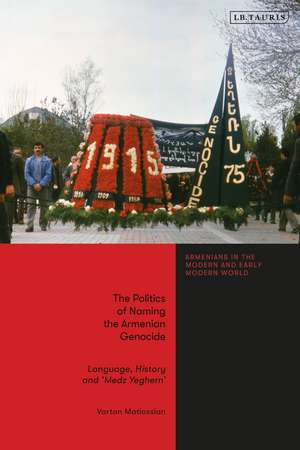The Politics of Naming the Armenian Genocide: Language, History and ‘Medz Yeghern’: Armenians in the Modern and Early Modern World
Autor Vartan Matiossianen Limba Engleză Paperback – 30 noi 2022
| Toate formatele și edițiile | Preț | Express |
|---|---|---|
| Paperback (1) | 136.27 lei 3-5 săpt. | +55.47 lei 6-10 zile |
| Bloomsbury Publishing – 30 noi 2022 | 136.27 lei 3-5 săpt. | +55.47 lei 6-10 zile |
| Hardback (1) | 599.66 lei 6-8 săpt. | |
| Bloomsbury Publishing – 20 oct 2021 | 599.66 lei 6-8 săpt. |
Preț: 136.27 lei
Preț vechi: 174.30 lei
-22% Nou
Puncte Express: 204
Preț estimativ în valută:
26.08€ • 28.32$ • 21.91£
26.08€ • 28.32$ • 21.91£
Carte disponibilă
Livrare economică 02-16 aprilie
Livrare express 18-22 martie pentru 65.46 lei
Preluare comenzi: 021 569.72.76
Specificații
ISBN-13: 9780755641123
ISBN-10: 0755641124
Pagini: 296
Dimensiuni: 156 x 234 x 25 mm
Greutate: 0.45 kg
Editura: Bloomsbury Publishing
Colecția I.B.Tauris
Seria Armenians in the Modern and Early Modern World
Locul publicării:London, United Kingdom
ISBN-10: 0755641124
Pagini: 296
Dimensiuni: 156 x 234 x 25 mm
Greutate: 0.45 kg
Editura: Bloomsbury Publishing
Colecția I.B.Tauris
Seria Armenians in the Modern and Early Modern World
Locul publicării:London, United Kingdom
Caracteristici
Uses both Armenian and a wide range of non-Armenian sources to explore the history of the name and concept of the Armenian Genocide
Notă biografică
Vartan Matiossian is a historian and literary scholar living in the United States. He received his PhD from the Academy of Sciences of Armenia and has taught Armenian history and language in Buenos Aires and New Jersey from 1988-2004 on primary, secondary and college levels. He has authored four books in Armenian three books in Spanish, has edited or co-edited three volumes (Spanish, English, and Armenian), and translated 12 volumes from Armenian into Spanish.
Cuprins
AcknowledgmentsA Note on Transliteration Introduction Silencing the Name Part I Language and HistoryChapter 1 Yeghern until the Late Nineteenth CenturyChapter 2 Yeghern before and after 1915Chapter 3 Medz Yeghern and "Genocide" in Armenia and the Diaspora Part II Politics and LanguageChapter 4 Vatican: "From the Depths of the Metz Yeghérn" Chapter 5 Turkey: "The Denial of the Great Catastrophe"Chapter 6 United States: "Genocide of the Armenians" and "Meds Yeghern" Chapter 7 From Uruguay to the United States: On Words of Recognition Conclusion Unsilencing the Name Appendix A The Meaning of Yeghern in ScholarshipAppendix B Yeghern and "Genocide" in Memorial Inscriptions Bibliography
Recenzii
Vartan Matiossian's book is an erudite overview of the uses of the Armenian word Yeghern across the ages and an in-depth study of the systematic misuses of this same word in translation within the languages of the civilized world, especially in the last few decades, allegedly for the sake of reconciliation or for more obscure political reasons. The Politics of Naming the Armenian Genocide offers its readers a superb demonstration of the fact that, at least in the cases where genocidal will is at work, an event can acquire a historical existence only through its meaningful reception. This is yet another confirmation of the Hegelian law according to which there can be reality only there where some sense is involved, albeit retrospectively.
Matiossian offers an analytical narrative of the changing uses of "Medz Yeghern," one of several terms used by Armenians to denote the genocide they suffered a generation before Lemkin invented that English term. Immersed in the historical record as well as the contemporary archives of Armenian genocide memorialization, Turkish denial and American collaboration with that effort, Matiossian offers a matchless analysis of texts ranging from newspaper articles and books to 114 monuments and shows how diplomats seeking to evade the moral and legal consequences of fully acknowledging the genocide sought to use the Armenian term for shameful camouflage. His compelling analysis is a unique contribution and its two lengthy Appendices offer a matchless record for future investigations of the links between language and politics.
Matiossian offers an analytical narrative of the changing uses of "Medz Yeghern," one of several terms used by Armenians to denote the genocide they suffered a generation before Lemkin invented that English term. Immersed in the historical record as well as the contemporary archives of Armenian genocide memorialization, Turkish denial and American collaboration with that effort, Matiossian offers a matchless analysis of texts ranging from newspaper articles and books to 114 monuments and shows how diplomats seeking to evade the moral and legal consequences of fully acknowledging the genocide sought to use the Armenian term for shameful camouflage. His compelling analysis is a unique contribution and its two lengthy Appendices offer a matchless record for future investigations of the links between language and politics.










